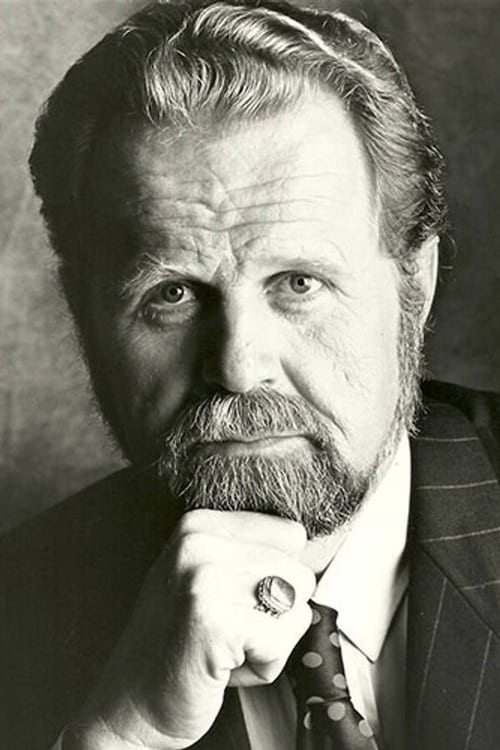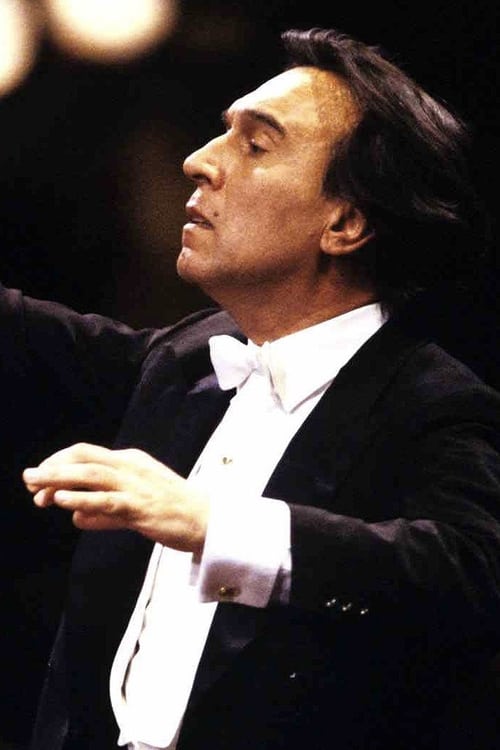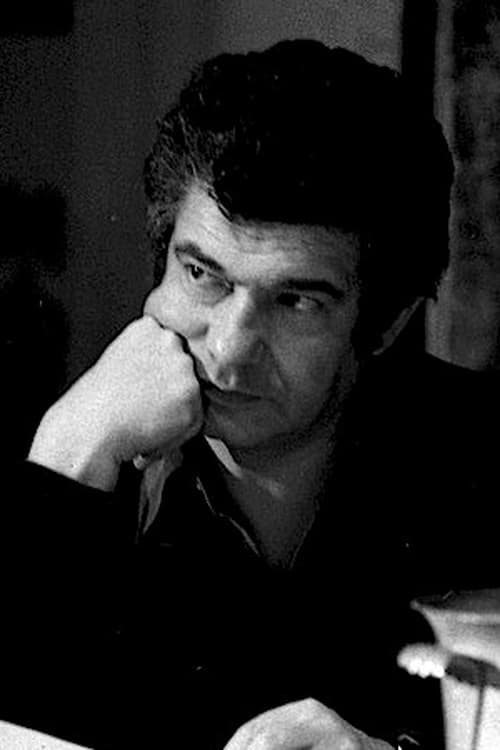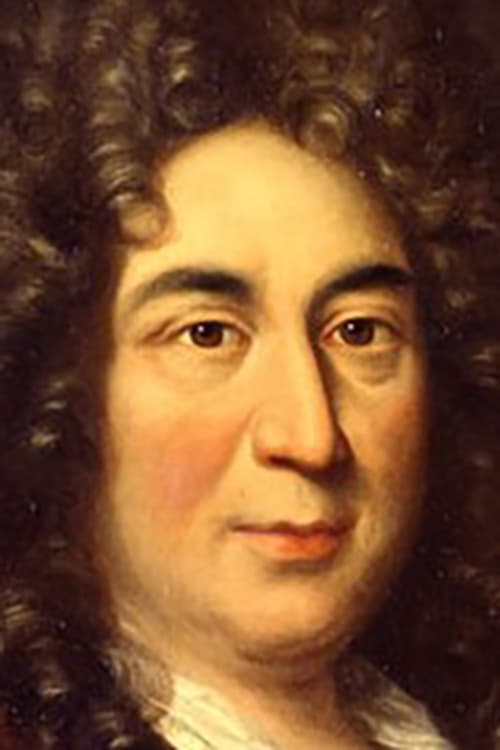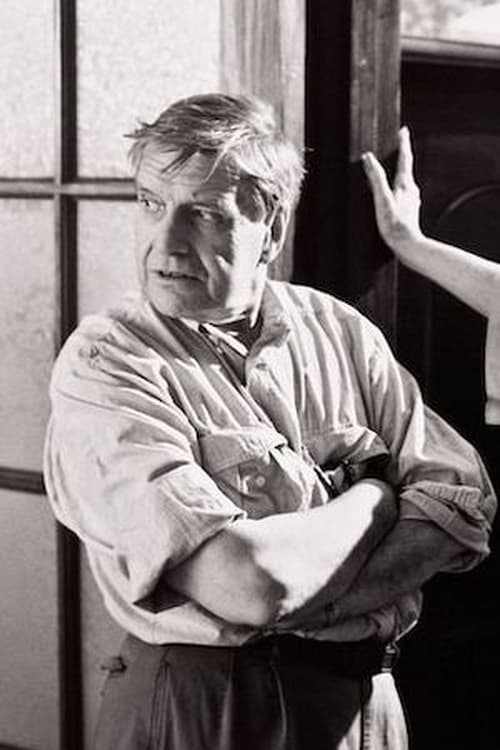
La Cenerentola (1981)
Género : Comedia, Música
Tiempo de ejecución : 2H 31M
Director : Jean-Pierre Ponnelle
Sinopsis
The Prince, Don Ramiro (who has changed places with his valet, Dandini), meets Cenerentola and they are instantly attracted to each other. When the Philosopher, Alidoro, later takes Cenerentola (dressed in magnificent clothing) to the palace, Dandini (still posing as the prince) tries to talk of love to her, but Cenerentola rejects him, saying that she is in love with his 'valet'. Ramiro, who has overheard this comment, is overjoyed, and immediately proposes to her, but Cenerentola says that he must first seek her out and then, if he still felt the same way, she would marry him. She gives him one of a matching pairs of bracelets, telling him to look for its companion on her right arm (she then leaves the palace). Ramiro ends the masquerade, and he and Dandini resume their true identities. The Prince then sets out on his quest - little realising that destiny, in the form of a violent thunderstorm, is about to take a hand in the affair.

Mary quiere convertirse en cantante de ópera y empieza a recibir clases del maestro Guilio Monteverdi. Poco a poco ambos se irán enamorando. (FILMAFFINITY)
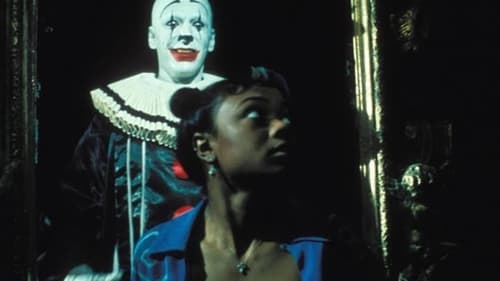
La diva Lorraine Sedwick es brutalmente asesinada por su amante, el famoso tenor Lorenzo Orsini, pero el crimen queda sin resolver. Quince años más tarde, una serie de terribles pesadillas torturan a Kate, la hija de Lorraine, por lo que decide visitar con su amiga Mónica el escenario del crimen. Cuando el dueño del teatro en que trabajaba su madre le revela que el local está habitado por el fantasma de Orsini, Kate vuelve a tener una terrorífica pesadilla.

Deutsche Grammophon proudly presents the new faces of the opera world in a glamorous new live concert DVD: Anna Netrebko, Elına Garanca, Ramón Vargas and the highly acclaimed young French baritone Ludovic Tézier sing a wide range of Italian and French opera favorites. This recording features highlights from concerts at Baden- Baden's Festspielhaus, where tickets to this extraordinary event sold out in record time. The DVD features the four young stars performing duets and the popular quartet "Bella figlia dell'amore" from Rigoletto. Other highlights include Delibes' famous flower duet from Lakmé performed sumptuously by Anna and Elına.

Giuseppe Verdi, adolescente soñador e inconformista, decide abandonar su ciudad natal para estudiar música en Milán. Enfrentado al rechazo inicial del selecto círculo de la ópera italiana, Verdi vive en el fracaso hasta que conoce a la popular soprano Giuseppina Strepponi, con la que contrae matrimonio y comienza así una intensa trayectoria tan llena de éxitos como de fracasos.
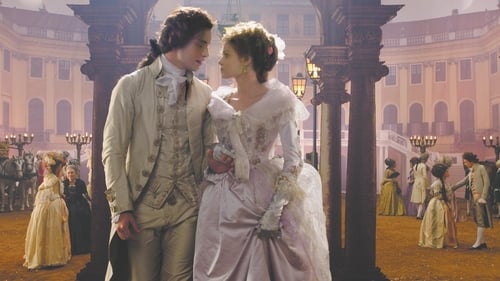
Trata sobre los entresijos de la creación de la famosa ópera de Mozart. El film se centra en Lorenzo Da Ponte, el autor del libreto y la fuerza inspiradora de la obra del genio austríaco. Una coproducción. Obtuvo muy buena acogida en su estreno mundial en el Festival de Toronto de 2009.

Live performance from Schwetzinger Festspiele, 1988. What sets this IL BARBIERE DI SIVIGLIA apart from all others available is its elegant realism. None of its visuals are the least bit cartoonish or blatantly designed for comedy. Dr. Bartolo’s house is a stark, stern-looking structure of plastered brick with a comfortable yet plain, white-curtained interior, while the costumes are highly realistic 18th century garb in subdued colors. Yet despite its fairly austere appearance the production is delightful, thanks to its performers and staging. The stage business is lively, witty and free of excessive slapstick, and every singer brings his or her character to life, all offering rich, vibrant characterizations that strike a perfect balance between comedy and humanity.
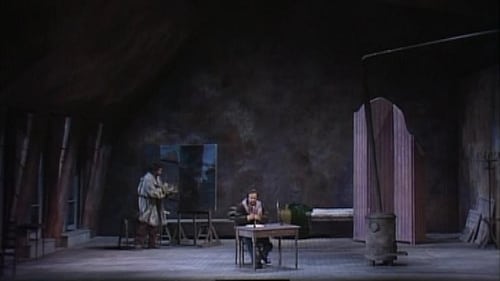
La agridulce ópera de Giacomo Puccini sobre animosos bohemios y el amor condenado entre Rodolfo, el poeta idealista y Mimi, la florista tísica, es una serie de cuadros maravillosamente equilibrados que representan la contagiosa alegría de vivir de la juventud y el trágico desperdicio de la enfermedad y separación. La legendaria e incomparable asociación de Mirella Freni y Luciano Pavarotti como los dos amantes ha sido capturada en esta grabación especial en vivo desde el escenario de la Ópera de San Francisco. Brian Large ha adaptado la producción de Francesca Zambello para video, iluminando aún más la fascinante interacción de los personajes de Puccini. Gino Quilico canta Marcello, el pintoresco y tempestuoso pintor, cuya tempestuosa relación con la coqueta Musetta (cantada por Sandra Pacetti), refleja cómicamente el amor más profundo de Rodolfo y Mimi. Nicolai Ghiaurov canta Colline.

AIDA, an Ethiopian princess, is captured and brought into slavery in Egypt. A military commander, Radamès, struggles to choose between his love for her and his loyalty to the Pharaoh. To complicate the story further, Radamès is loved by the Pharaoh's daughter Amneris, although he does not return her feelings. Sonja Frisell’s production captures all the grandeur and excitement of Verdi’s monumental opera, particularly the great triumphal scene where the Egyptian army, led by Radamès (Plácido Domingo), returns victorious from war. Aprile Millo is Aida, the slave girl whose love for Radamès has her squaring off with Amneris (Dolora Zajick), the Egyptian princess who also loves him. Sherrill Milnes is Amonasro, and James Levine leads The Metropolitan Opera Orchestra, Chorus, and Ballet.
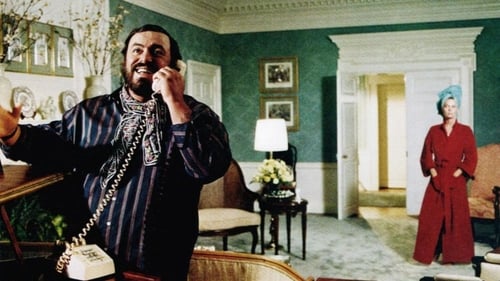
Comedia melodramática con Luciano Pavarotti interpretando a un cantante de ópera que consigue, gracias al amor, recuperar la voz perdida.

While the rest of the Hebrews bewail their fate, Samson alone trusts in God's promise of liberty. Abimelech, the Philistine satrap of Gaza, enters to mock the Hebrews' God, proclaiming the superiority of Dagon, and the Hebrews are afraid of him. But calls them to show some defiance, so Abimelech attacks Samson with his sword. Samson seizes the sword and strikes him dead. The Hebrews scatter and the High Priest of Dagon appears, cursing the Hebrews. When a messenger reports that the Hebrews are ravaging the harvest, the High Priest forms a plan to use Delilah to overcome Samson's strength. Delilah's beauty is such that Samson can't resist her for long. She begs to know the secret of his supernatural strength, but he refuses, though he says he loves her. Delilah betrays Samson by having some Philistine soldiers seize him and throw him into a prison in Gaza, where his hair is cut off.
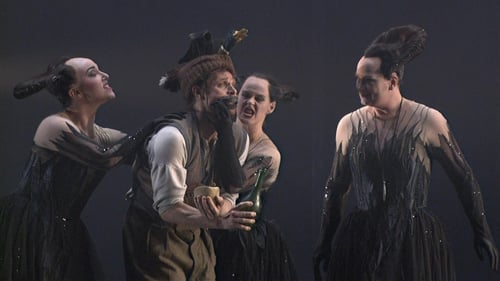
The Magic Flute opens with Prince Tamino being rescued from a serpent by Ladies in the employ of the Queen of the Night. Papageno the bird-catcher arrives and claims he killed the serpent, but the outraged Ladies padlock Papageno's mouth for his lie. They also show Tamino a portrait of Princess Pamina, the Queen's kidnapped daughter, and he immediately falls in love. Protected by a golden flute, he sets off with the bird-catcher Papageno to rescue Pamina from the clutches of the sorcerer Sarastro and a madcap adventure involving magicians, wild animals and very Masonic-like trials. Triumphing over all adversity, the lovers unite, as the forces of light banish the darkness and Papageno even finds a true love of his own. The internationally renowned Mozart interpreter Sir Colin Davis conducts the chorus and orchestra of the Royal Opera House and a glittering cast in David McVicar's 2003 production of the opera Mozart wrote in the final year of his life, recorded live at Covent Garden.
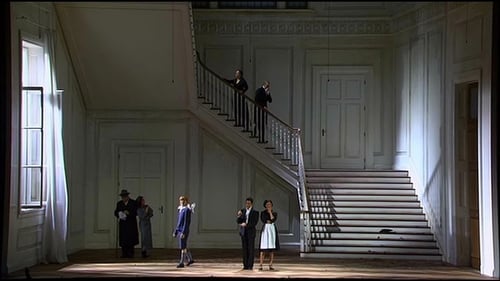
This release contains the celebrated 2006 production of Mozart's Nozze di Figaro that was directed for the stage by Claus Guth at that year's Salzburg Festival. Ildebrando D'Arcangelo takes the title role, and gets support from Anna Netrebko as Sussanna, Bo Skovhus as Il Conte Di Almaviva, and Dorothea Roschmann as La Contessa. Nikolaus Harnoncourt conducts the orchestra.

Violetta, a courtesan much wooed by Parisian society, organizes a grand party that is attended, amongst others, by the young Alfredo Germont. He confesses his feelings to Violetta, who is already suffering from consumption. She vacillates between genuine affection and a realistic assessment of her situation as a "fallen woman", which precludes any lasting relationship with a man. The Willy Decker production of La Traviata, recorded live at the Salzburger Festspiele in August, 2005. Anna Netrebko stars as Violetta Valéry, with Rolando Villazón as Alfredo Germont and Thomas Hampson as Giorgio Germont. Carlo Rizzi conducts the Wiener Philharmoniker.
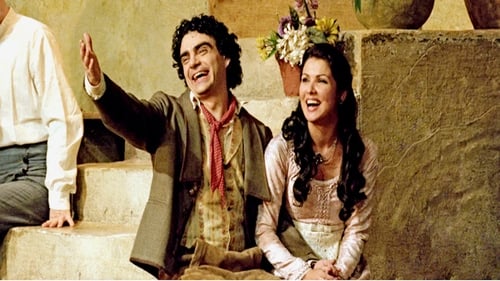
Donizetti's L'Elisir d'Amore is one of the staples of the comic opera repertory. The plot hinges on whether earnest but dim-witted Nemorino will snag Adina, the flirtatious heroine. She's a tease who takes up with Belcore, an army sergeant, to make Nemorino jealous. After numerous (and humorous) plot twists that include a phony love potion, it all ends happily. Adina and Nemorino declare their love for each other, Belcore is dumped, and the fraudulent Dulcamara does a landslide business in love potions. It's all a fast-moving bundle of fun, especially with the star-filled cast of this 2005 Vienna State Opera performance.
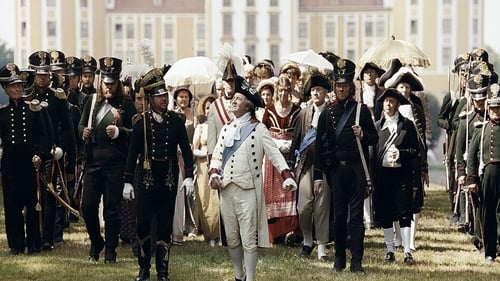
Inspired by Carl Maria von Weber's Der Freischütz, the film opera Hunter's Bride traces the romantic rivalry between two veterans of the Napoleonic Wars who each vie for the heart of the same woman.
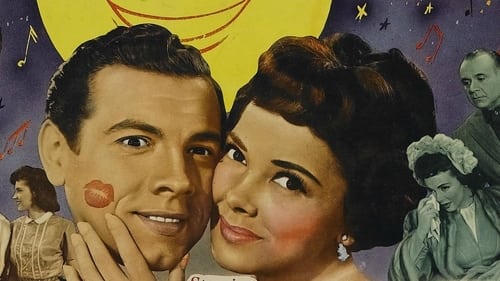
Opera singer Prudence Budell, overhears truck driver Johnny Donnetti singing opera, and persuades her opera company to give him a chance in her new opera. They fall in love, but on meeting his colleague Mary while visiting Johnny's work, Prudence becomes convinced Johnny is in love with her.

PRELIMINARY EVENINING OF THE RING CYCLE. Upon the banks of the ageless river Rhine, the Rhinemaidens play. Alberich, a Nibelung dwarf, tries vainly to seduce one of them. To taunt him, they reveal their secret: out of the gold they guard one can forge a Ring to rule the world, but at the cost of giving up Love forever. Alberich steals the gold, makes the ring and plans his world take-over. Meanwhile, Wotan, King of the Gods, must figure out how to finance the construction of Valhalla. He has promised his sister-in-law as payment to the giant construction workers led by Fafner, but his wife Fricka disapproves. Loge (God of Fire) tricks Alberich and brings him to Wotan, who takes the Ring. In revenge Alberich curses it: lack of the Ring will fuel desire for it and possession will only lead to misery. Wotan gives the Ring to Fafner as ransom for Fricka's sister. Filmed at the Bayreuth Festspielhaus in June & July 1991.

SECOND DAY OF THE RING CYCLE. Alberich's brother Mime raises the orphan Siegfried, hoping that Siegfried will kill Fafner and enable Mime to gain the ring. Mime attempts unsuccessfully to reforge the Nothung. Fulfilling prophecy, Siegfried reforges the sword himself and kills Fafner, who has the form of a dragon. When he accidentally tastes the dragon's blood spilt on his hands, Siegfried understands the song of a woodbird, who instructs him to take the Ring from Fafner. Reading Mime's thoughts of betrayal, Siegfried kills the dwarf as well. The woodbird also informs Siegfried of a mysterious woman asleep in the midst of fire, and Siegfried sets off to find her. After defeating a disguised Wotan and breaking his spear, Siegfried successfully awakes Brünnhilde, and the two fall in love. Filmed at the Bayreuth Festspielhaus in June & July 1992.

THIRD DAY OF THE RING CYCLE. Günter, the lord of the Rhine people, gives Siegfried a love potion that causes Siegfried to forget Brünnhilde and fall in love with Günter's sister Gutrane. Siegfried has given Brünnhilde the Ring as a token of their love, but her Valkyrie sister urges her to destroy it, because their father Wotan has lost his spear and power and is hiding out in Valhalla. Instead, Brünnhilde keeps it, and under the influence of the potion, Siegfried steals it from her. Enraged, Brünnhilde helps Alberich's son murder Siegfried, but Siegfried's memory returns, and he dies thinking of Brünnhilde. Brünnhilde repents and orders a funeral pyre to be built. She rides into the fire herself, and the Rhinemaidens get the ring back. The story closes with flames flickering about Valhalla in the background. Filmed at the Bayreuth Festspielhaus in June & July 1991.

This is a beautifully conducted and thoughtfully staged performance of the first opera (the prologue) in Wagner's Ring Cycle. As soon as the clouds of mist have dissipated, while the daring, long-held opening chord is still reverberating, the screen clears to show not only the River Rhine and the three maidens (dressed like prostitutes in this production) assigned to guard the gold hidden there. It also shows an enormous dam (not mentioned in Wagner's text). This is the underwater base of a hydroelectric plant, and its presence tells us two things immediately: that this production takes the story out of the vaguely medieval fantasy world in which Wagner had placed it, and that a basic theme of the four-opera cycle would be power. Alberich, the Nibelung, is willing to renounce the love of women, after stealing the gold from the Rhine, to become the ruler of the world. Another basic theme is greed.


